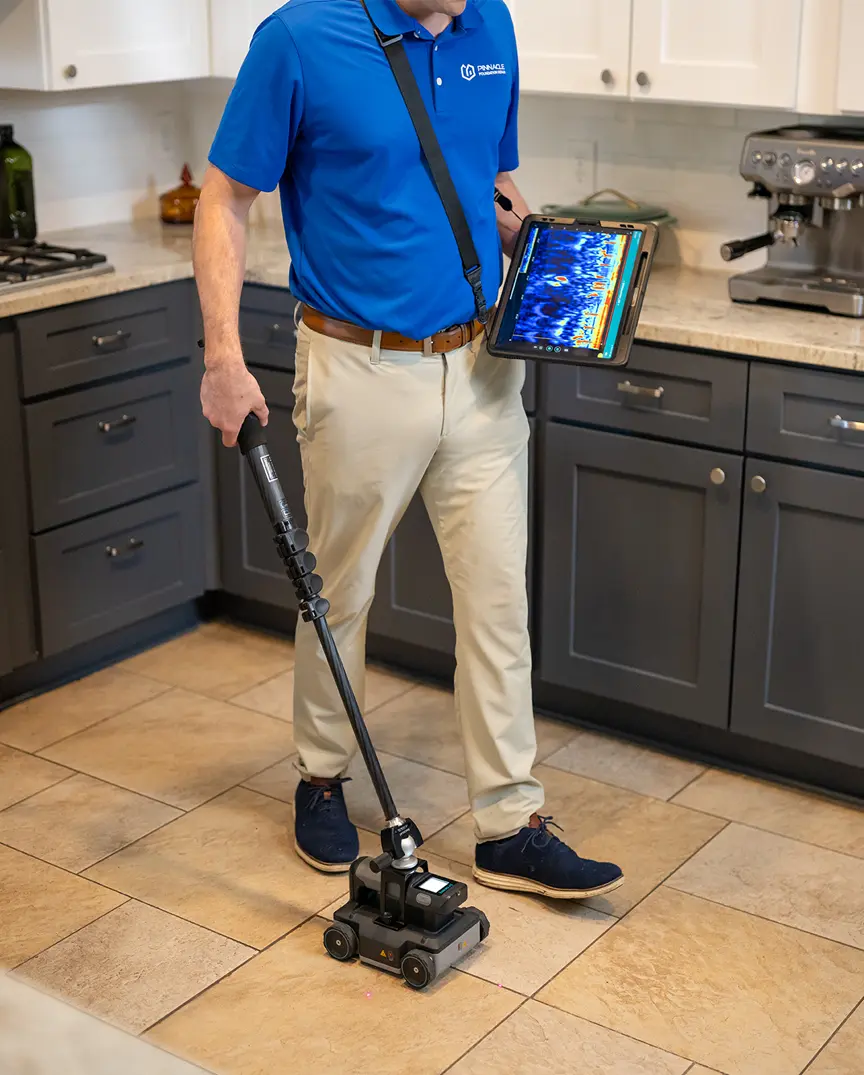Foundation Spread Footings
Structural Support: Building Blocks Below
10-YEAR WARRANTY
Contact Us
If you have any query about our service please contact with us
Foundation spread footing is a type of shallow foundation used to support the load of a building. This type of foundation is specially designed to spread the weight of the building over a larger area of soil, which reduces pressure on the ground.
Our spread footings are constructed with rebar-reinforced concrete – perfect for transmitting and distributing the load coming from the structure above to the soil beneath it. Spread footings are ideal for shallow rock areas or structures too light to hydraulically press a pier: retaining walls, wing walls, enclosed patios, or anything lacking a grade beam.
Types of Spread Footings
Spread footings come in two main types: continuous footings and isolated pad footings.
Continuous Footings: These spread footings primarily support walls, acting as basement or frost walls. They are typically made of reinforced concrete or masonry, with concrete blocks being a cost-effective alternative.
Isolated Pad Footings: These spread footings support concentrated loads and are made of concrete poured directly on undisturbed soil.
How are Spread Footings installed?
To create a spread footing in most of our typical projects, we start by digging out a three-foot by three-foot square haunch below the existing structure. Normally this excavation is done with bulldozers and backhoes. We then fill it with concrete and reinforce it with rebar.
Here’s the unique thing about spread footings – they can be circular, square, or rectangular, and are designed to be flexible depending on the structure to most efficiently distribute loads over a larger area of soil. While in most cases we recommend using rebar-reinforced concrete, concrete blocks are also a cost-effective alternative.
Pros and Cons of Spread Footings for Foundation Repair
Pros:
Versatility: Spread footings can be designed to support a wide range of structures, from small residential buildings to large commercial developments. They can also be constructed in different shapes and sizes to accommodate specific design requirements.
Cost-Effectiveness: They are often more cost-effective than other foundation types, especially in areas where the soil conditions are already favorable.
Stability: Spread footings distribute the load of the building over a larger area of soil evenly, which reduces the risk of settlement and structural damage to buildings.
Ease of Construction: They are relatively simple to construct and can be adapted to various soil and building conditions.
Durability: Spread footings are less prone to failure than other footing types, therefore providing long-term stability and support for the building.
Cons:
Size: While versatile, spread footings still often take up more space than other types of foundations, which may be a concern in areas with limited space.
Longer Installation Time: After installing, the curing time for concrete can be five to seven days.
Soil Conditions: If the soil is not properly compacted, is overly clay-heavy, or has drainage issues, it can lead to potential settling or other foundation issues down the road.
Radically Honest and Transparent
Around here, we’re always on the level. We take the time to explain problems and possible solutions in plain language, walk you through the process, and answer all your questions before, during and after the project. To make communication even easier, your home evaluator is also your main point of contact throughout. Radically simple? You bet.
At Pinnacle Foundation Repair, we are committed to providing not just repairs, but lasting stability for your home or business. We also stand by our work with a radical commitment: a 10-year warranty on all our spread footing solutions.
Contact us today for a FREE consultation and discover why our spread footing installation methods stand as a testament to our radical reliability and dependability in foundation repair.
Frequently Asked Questions
What are foundation spread footings?
Spread footings are shallow foundations that distribute the weight of a building over a larger area of soil, reducing pressure on the ground.
When are spread footings used?
They’re ideal for structures on shallow rock or light buildings like patios, retaining walls, and areas without grade beams.
What types of spread footings are there?
There are two main types: continuous footings, which support walls, and isolated pad footings, which support concentrated loads.
How are spread footings installed?
We dig a haunch under the structure, fill it with rebar-reinforced concrete, and customize the shape to distribute the load effectively.
What are the benefits of spread footings?
They’re versatile, cost-effective, stable, easy to build, and durable, offering long-term support for a variety of structures.
Are there any downsides to using spread footings?
They require more space, have a longer curing time, and depend on good soil conditions to avoid settling issues.
Can spread footings be customized?
Yes, they can be circular, square, or rectangular, designed to fit the specific needs of your structure.
How long does it take to install spread footings?
The installation process is straightforward, but the concrete needs about five to seven days to cure.
What makes spread footings cost-effective?
They use less material and are easier to construct, especially in good soil conditions, making them more affordable than other foundation types.
Do spread footings come with a warranty?
Yes, Pinnacle offers a 10-year warranty on all our spread footing solutions, ensuring lasting stability.

Schedule a FREE foundation evaluation
Don t wait till the cracks in the walls or the sticking doors become worse. Let us inspect your foundation free of charge, determine the cause of your problems and, if you have a foundation issue, give you a fair estimate. 1 out of 3 evaluations we conduct reveal no foundation issues
or call this number
